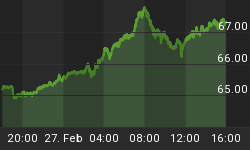The Euro has become a very odd, very toxic asset...
What's up with the gold price? Not a lot. Gold is down, in fact. So is everything else outside the US Dollar and "safe" sovereign debt.
"I think what we can expect is a rate cut from the ECB [European Central Bank]," reckons Joachim Fels, chief economist at Morgan Stanley, speaking to Bloomberg on Wednesday.
"I think they will cut soon, as early as the June meeting...But unfortunately, a rate-cut alone doesn't do the trick."
The trick to do, naturally, is sticky-taping the Eurozone together by destroying the Euro. Or decimating its value at least. You might expect that to boost the gold price, and everything else besides. But the Euro is becoming so toxic, even incorruptible gold looks at risk of being corroded by the Esperanto Experiment.
Same happened in 2008, remember. Top to bottom, Dollar-priced gold lost one-third...corrupted like everything else bar the Dollar and T-bonds by the corrosion of debt-deflation as the first wave of the US credit bubble burst.
"The least disruptive route Europe can take is to sharply lower the value of the Euro," says finance academic Jeremy Siegel in the Financial Times. "If devaluation is a code word to mean raising the inflation target, fine," says Princeton professor Paul Krugman.
Naturally, a cheapened Euro would mean lower Euro exchange rates. Standard Bank just cut their long-running forecast of $1.20, but only down to $1.15. Because even with El Tro Part 3 or QE the First, the Esperanto is unlikely to tumble.
How come? Now down less than 7% from its February high, the Euro is making for a very odd problem, corrupting everything but itself. Because when they got German interest rates and a global market for their government debt, half of its sovereign members went nuts spending and borrowing. But Germany itself pushed on with boring hard work, wage restraint, and world domination in high-spec machinery and engineering. The internal imbalance seems to demand a fiscal transfer - of German savings to settle Club Med's bills.
At tonight's "informal" summit, however - as at every summit to date - Chancellor Merkel is set to say "Nein!" yet again. Why would Germany want to join Eurozone joint bond issues? It's already gifted its credit rating to Mediterranean debt, and look where that got us. Besides, Merkel can after all borrow money at 0% rates, or near as dammit. Why doesn't the rest of Europe understand the model?
This week's fresh impasse would surely send the Euro lower again, if only Germany weren't the Eurozone's biggest economy. So instead, the stress cracks run into everything else that isn't the Dollar (or 'safe' sovereign debt). Including - bizarrely - the ultimate default-or-devaluation protection of physical gold bullion.
But in a credit deflation - which this is - and after being buoyed by the global liquidity surge of the last decade, gold and silver should be expected to hit turbulence at the least. That's even before you account for the sudden resurgence of the all-Apple, Facebook-toting, shale-gas-laden US Dollar. If resurgence you can call it.
On its trade-weighted index the Dollar has reclaimed only an 18-month high, and has barely dented its 35% drop of the past decade. Just imagine what trouble it's got in store for us all - US exporters and consumers, as well as investors and debtors worldwide - if the thing really does start to push higher.















